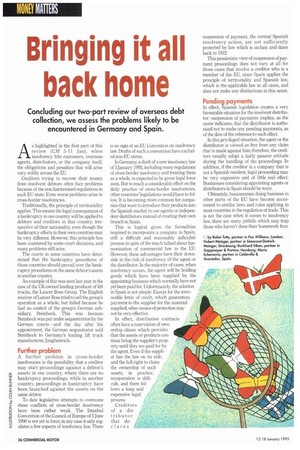Bringing it all back home
Page 38

If you've noticed an error in this article please click here to report it so we can fix it.
Concluding our two-part review of overseas debt collection, we assess the problems likely to be encountered in Germany and Spain.
As highlighted in the first part of this review (CM 5-11 Jan), when insolvency hits customers, overseas agents, distributors, or the company itself, the obligations and penalties that will arise vary wildly across the EU.
Creditors trying to recover their money from insolvent debtors often face problems because of the non-harmonised regulations in each EU state. Even worse problems arise in cross-border insolvencies.
Traditionally, the principle of territoriality applies. This means the legal consequences of a bankruptcy in one country will be applied to debtors and creditors in that country, irrespective of their nationality, even though the bankruptcy effects in their own countries may be very different. However, this principle has been countered by some court decisions, and many problems still arise.
The courts in some countries have determined that the bankruptcy procedures of those countries should prevail over the bankruptcy procedures on the same debtor's assets in another country.
An example of this was seen last year in the case of the UK-owned leading producer of lift trucks, the Lancer Boss Group. The English receiver of Lancer Boss tried to sell the group's operation as a whole, but failed because he had no control of the group's German subsidiary, Steinbock. This was because Steinbock was put under sequestration by the German courts—and the day after his appointment, the German sequestrator sold Steinbock to Germany's leading lift truck manufacturer, Jungheinrich.
Further problem
A further problem in cross-border insolvencies is the possibility that a creditor may start proceedings against a debtor's assets in one country, where there are no bankruptcy proceedings, while in another country, proceedings in bankruptcy have been launched against the assets on the same debtor.
To date legislative attempts to overcome these conflicts of cross-border insolvency have been rather weak. The Istanbul Convention of the Council of Europe of 5 June 1990 is not yet in force; in any case it only regulates a few aspects of insolvency law. There is no sign of an EU Convention on insolvency law. Drafts of such a convention have excluded non-EU states.
In Germany, a draft of a new insolvency law of 3 January 1992, including many regulations of cross-border insolvency and treating them as a whole, is expected to be given legal force soon. But to reach a considerable effect on the daily practice of crass-border insolvencies, other countries' legislations would have to follow. It is becoming more common for companies that want to introduce their products into the Spanish market to use agents or independent distributors instead of creating their own branch in Spain.
This is logical given the formalities required to incorporate a company in Spain, still a difficult and reasonably inflexible process in spite of the much talked about harmonisation of commercial law in the EU. However, these advantages have their downside in the risk of insolvency of the agent or the distributor. In the majority of cases, when insolvency occurs, the agent will be holding goods which have been supplied by the appointing business which normally have not yet been paid for. Unfortunately, the solution in Spain is not simple. Except for the irrevocable letter of credit, which guarantees payment to the supplier for the material supplied, other means of protection may not be very effective.
In effect, distribution contracts often have a reservation of ownership clause which provides that the assets or products continue being the supplier's property until they are paid for by the agent. Even if the supplier has the law on its side. and the full right to claim the ownership of such assets, in practice. recuperation is difficult, and there follows a long and expensive legal process.
Creditors of a distributor that declares suspension of payment, the normal Spanish insolvency action, are not sufficiently protected by law which is archaic and dates back to 1922.
This pessimistic view of suspension of payment proceedings does not vary at all for those cases that involve a creditor who is a member of the EU, since Spain applies the principle of territoriality and Spanish law, which is the applicable law in all cases, and does not make any distinctions in this sense.
Pending payments
In effect, Spanish legislation creates a very favourable situation for the insolvent distributor: suspension of payments implies, as the name indicates, that the distributor is authorised not to make any pending payments, as of the date of the reference to such effect.
In this privileged situation, the agent or the distributor is viewed as free from any claim that is made against him; therefore, the creditors usually adopt a fairly passive attitude during the handling of the proceedings. In addition, if the creditor is a company that is not a Spanish resident, legal proceeding may be very expensive and of little real effect. Businesses considering appointing agents or distributors in Spain should he wary.
Ultimately, businessmen doing business in other parts of the EU have become accustomed to similar laws and rules applying in most countries in the regulation of trade. This is not the case when it comes to insolvency law, there are many pitfalls which may trap those who haven't done their homework first.




















































































